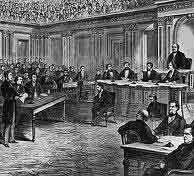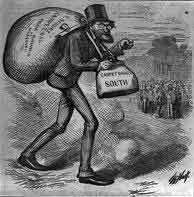Welcome to THE MAKING OF A NATION – American history in VOA Special English.
In March of 1868, Congress tried to remove President Andrew Johnson from office. But the Senate failed in the effort by one vote. Andrew Johnson was a Democrat. Congress was controlled by radical members of the Republican Party.
Most of the charges at Johnson's trial were based on his dismissal of the secretary of war. A new law said the president could not remove a cabinet officer without Senate approval. Johnson said the law was unconstitutional.

The trial was an important turning point in the making of the nation. Removal from office would have established the idea that the president could serve only with the approval of Congress. The president would have become, in effect, a prime minister, requiring the support of Congress to remain in office. Andrew Johnson's victory kept alive the idea of an independent presidency.
Although Congress failed to remove him, the vote did not end a conflict with the White House over the future of the South. But it did have an effect on efforts to rebuild the South following the war.
Radical Republicans wanted to punish the South for starting the war. They also wanted to be sure new governments in the southern states would support the Republican Party.
This week in our series, Doug Johnson and Frank Oliver tell about the reconstruction of the South.
DOUG JOHNSON:
One way radical Republicans gained support was by helping give blacks the right to vote. They knew former slaves would vote for the party which had freed them.
Another way Republicans kept control in the South was by preventing whites from voting there. They passed a law saying no southerner could vote if he had taken part in the rebellion against the Union. This prevented the majority of southern whites from voting for Democrats and against Republicans.
FRANK OLIVER:

Congress also made strong rules about what southern states had to do to re-enter the Union. It said each of the states needed a new constitution that protected the voting rights of all black men. And it said each southern state must approve an amendment to the United States Constitution that gave citizenship to blacks.
The radicals did not rest with changes in the law. They also sent their supporters south to organize blacks for the Republican Party. Many southern whites hated these men from the North. They had a special name for them: carpetbaggers.
The name arose because many of the northerners who went south arrived with all their possessions in a carpet handbag. Southerners also had a name for their own people who cooperated with the carpetbaggers. They called them scalawags. Neither name was friendly.
DOUG JOHNSON:
Southern whites had a reason to be bitter. They had lost the Civil War. Now much of their power was gone, and they were suffering. But there was another side to the story, as well.
Southern whites had held black people in slavery for many years. Now, the former slaves were getting to enjoy a small taste of freedom. Also, the South had started the Civil War which had caused so much death and destruction. It was not surprising that the North showed little sympathy when the fighting stopped and the South lay in ruins.
Southern states organized conventions to form new governments. Soon, all but three southern states had new legislatures.
Not surprisingly, radical Republicans held firm control in every one of the new governments. Many of the new governors and state officials were carpetbaggers from outside the state. Others were southern scalawags.
FRANK OLIVER:
Many of these new state officials were dishonest. They began using their power to become rich.
In South Carolina, for example, the new governor was a former army officer from the state of Ohio. He gave government jobs to many dishonest men, including some who were wanted for crimes in other states.
The same situation existed in other state governments in the South. In Louisiana, for example, the governor was a carpetbagger from the state of Illinois. He left office after four years with one million dollars. His official pay during that time was only 32,000 dollars.
DOUG JOHNSON:
The South was not the only place where public officials were dishonest.
The period after the Civil War in the United States was marked by several famous incidents involving violations of the public trust. Some of these incidents took place in the North, even in the White House. They were among the worst examples of dishonesty and poor government ever to take place in American history.
It also is important to note that not everyone in the South was dishonest. The new state governments did many good things.
They built roads and bridges, schools and hospitals. They improved transportation and education. They loaned money to companies to build railroads. Most important, they helped give hope to former slaves. These people were struggling to create a new life in the land of their former owners.
FRANK OLIVER:
So, the record of reconstruction in the South was mixed. Many southerners believe, even today, that reconstruction was a bitter time of defeat. But others now say this period after the Civil War was a necessary step in creating a different kind of South from the one which had existed before.
Historians do agree that reconstruction changed the United States in several important ways. One of the most important changes was in the Constitution. Congress passed three historic amendments to the Constitution during this period.
DOUG JOHNSON:
The first was the Thirteenth Amendment. It ended slavery in the United States.
The next was the Fourteenth Amendment. It said all persons born or naturalized in the United States were citizens of the United States and of the state in which they lived. It said no state could limit the rights of these citizens.
Finally, there was the Fifteenth Amendment. It said a citizen of the United States could not be prevented from voting because of his color.
The Thirteenth Amendment freed all Negro slaves. The Fourteenth and Fifteenth Amendments were supposed to protect their rights. These laws alone, however, did not succeed in doing this. It would take another century -- until Martin Luther King and other civil rights leaders -- to make these rights a reality.
Yet the passage of these three amendments to the Constitution was still a historic step in making blacks full and equal citizens.
FRANK OLIVER:
These same laws and other actions of the radical Republicans changed the South in other -- less desirable, ways. They helped cause angry whites to form the Ku Klux Klan and other groups that terrorized blacks for years to come.
The laws also increased bitterness between the North and South that lasted many years.
Reconstruction changed the economy of the South, too. White landowners broke up their big farms into smaller pieces of land. They rented these to black farmers. With the land came seed, tools and enough supplies for a year. In exchange for this, the owner would get a large share of the crop raised by the tenant farmer.
This system, called share-cropping, spread through the South. It lasted for almost 100 years.
Share-cropping made it possible for blacks to work the land for themselves for the first time in their lives. But it also made it difficult for them to earn enough money to improve their condition. As a result, the majority of southern blacks remained in poverty. The system helped cause the South to be the poorest part of the United States for many years.
DOUG JOHNSON:
The reconstruction period changed the face of the South and of the United States. The events of reconstruction also were central to one of the nation's most interesting presidential elections.
That will be our story next week.
(MUSIC)
BOB DOUGHTY:
Our program was written by David Jarmul. The narrators were Doug Johnson and Frank Oliver. Transcripts, MP3s and podcasts of our programs are online, along with historical images, at voaspecialenglish.com. And you can follow us on Twitter at VOA Learning English. Join us again next week for THE MAKING OF A NATION - an American history series in VOA Special English.
carpetbagger: a person from the northern states of the US who went to the South after the Civil War in order to make money or get political power (美國內(nèi)戰(zhàn)后去南方)投機(jī)鉆營的北方人
scalawag: a white Southerner who supported Reconstruction policies after the American Civil War (usually for self-interest) 美國內(nèi)戰(zhàn)后支持重建政策的南方佬
American history series: Trial of Andrew Johnson
Andrew Johnson faces a fight over aiding South
American history series: the final surrender
American history series: after Lincoln's murder
President Lincoln is shot at Ford's Theater
American history series: Robert E. Lee's surrender
American history series: Confederate capital falls
Lincoln defeats McClellan in 1864 election
Sherman burns Atlanta in March to the Sea
American history series: the battle of cold harbor
Victory at Vicksburg splits the Confederacy
American history series: Lincoln at Gettysburg
South sees protests in North as an opening
American history series: Lee and his army cross into the North
The South wins a battle, but loses Stonewall Jackson
American history series: at Bull Run, a terrible defeat for the North
American history series: South defends its capital
American history series: the Civil War at sea
Lincoln names a general to defend Washington
American history series: the North loses the first major battle of the war
American history series: the Civil War's first days
(來源:VOA 編輯:陳丹妮)
